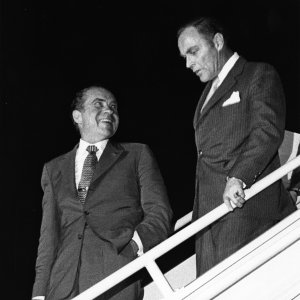For Americans 1968 was above all a political year. And for politician, Richard Milhous Nixon, it was the most important year of his life.
Richard Milhous Nixon: "As you will probably have heard, I have received a very gracious message from the Vice President, congratulating me for winning the election. I congratulated him for his gallant and courageous fight against great odds.
"I also told him that I know exactly how he felt. I know how it feels to lose a close one."
For Hubert Horatio Humphrey, it was a year that was difficult to assess.
Hubert Horatio Humphrey: "I have done my best. I have lost, Mr. Nixon has won. The democratic process has worked its will, so now let's get on with the urgent task of uniting our country, thank you."
Announcer: The United Press International, 1968 In Review, will continue with the story of the conventions, candidates, and campaigns, right after this message.
After picking up a string of victories in primary elections throughout the country, the Republican Party’s National Convention in Miami, Florida seemed to be a Richard Nixon show from the start, and it was. The voting wasn’t close as many predicted it would be, and Nixon won the nomination in the first ballot.
It was Wisconsin which put Nixon over the top.
So for the Republicans the race was on, to the degree that the Republican Convention was bland and undramatic, the Democratic Convention made up for it with vivid and at times unbelievable drama; inside and outside the Convention Hall.
Just days before the Convention began; the City of Chicago in some respects did not appear ready to handle the Convention. Cab drivers were threatening a strike. The telephone company and public transit workers were already out on strike, and added to that, antiwar groups and hippies had announced they were coming to Chicago to demonstrate against the war in Vietnam and against the Democratic Party.
To prepare for this eventuality, Chicago had 5,000 National Guardsmen on duty and the Chicago City Police Force was reinforced.
Inside of the Convention Hall, delegates defeated a move to put a dovish Vietnam Resolution into the party platform. Instead the platform stayed essentially the way Hubert Humphrey had wanted it.
For Eugene McCarthy, Humphrey’s strongest competitor, it was a large defeat that made it obvious that Humphrey and the Democratic machine were in charge. The McCarthy phenomenon, born with a near victory over Lyndon Johnson in the New Hampshire Primary, and nurtured with the following of young blood, was dead.
And as the Convention reached its peak with the nomination of Humphrey, the clash between Chicago Police and the demonstrators erupted.
The confrontations were violent and frequent. Mayor Richard Daley and the Chicago Police were criticized for their handling of the situation on one hand, and strongly supported on the other. But the aftermath left a stain on the Democratic Party’s image that Humphrey would try to erase during the campaign.
Hubert Horatio Humphrey: "This moment is one of personal pride and gratification, yet one cannot help but reflect the deep sadness that we feel over the troubles and the violence which have erupted regrettably and tragically in the streets of this great city. Surely we have now learned the lesson that violence breeds counter-violence, and it cannot be condoned, whatever the source."
Announcer: But the American Presidential race of 1968 was not settled with the emergence of Humphrey and Nixon from their respective conventions, George Corley Wallace, former Governor of Alabama, segregationist and prevailer of States' rights politics entered his name as the presidential candidate for the American Independent Party.
Wallace’s campaign techniques were based largely on an appeal for law and order. He made the appeal to the so-called common man; the working class person who according to him was offered no choice in Nixon and Humphrey. Wallace berated the press, the polls, intellectuals, liberals, and establishment, and the hippies and hecklers seemed to follow him everywhere he went. His call for law and order was repeated in every speech.
George Corley Wallace: "I can tell you that if I were the President of the United States, you could walk on the streets in any section of Washington D.C., at any time, and I would make that possible if I had to bring 30,000 troops to Washington and put one every 30 feet, with a 2 foot bayonet on the end of a rifle, we are going to make it safe for all the citizens of Washington D.C. because it's a sad commentary that in the nation's capital you are fearful of walking out of this hotel."
Announcer: But in American elections the people have the final say with the ballot, and on November the 5th, Richard M. Nixon was elected President in a surprisingly close vote.
Richard Milhous Nixon: "I saw many signs in this campaign; some of them were not friendly, some were very friendly. But the one that touched me the most was one that I saw in Dexter, Ohio, at the end of a long day of whistle-stopping. A little town, I suppose five times the population was there in the dusk, and it was almost impossible to see, but a teenager held up a sign, 'Bring us together'. That will be the great objective of this administration at the outset, to bring the American people together."
Announcer: The outcome of the election was affected by many events. Two of those events, two of the most poignant in the American history, were the Assassination of Dr. Martin Luther King Jr. and Senator Robert Kennedy.
United Press International looks back at those tragic stories on 1968 In Review.











